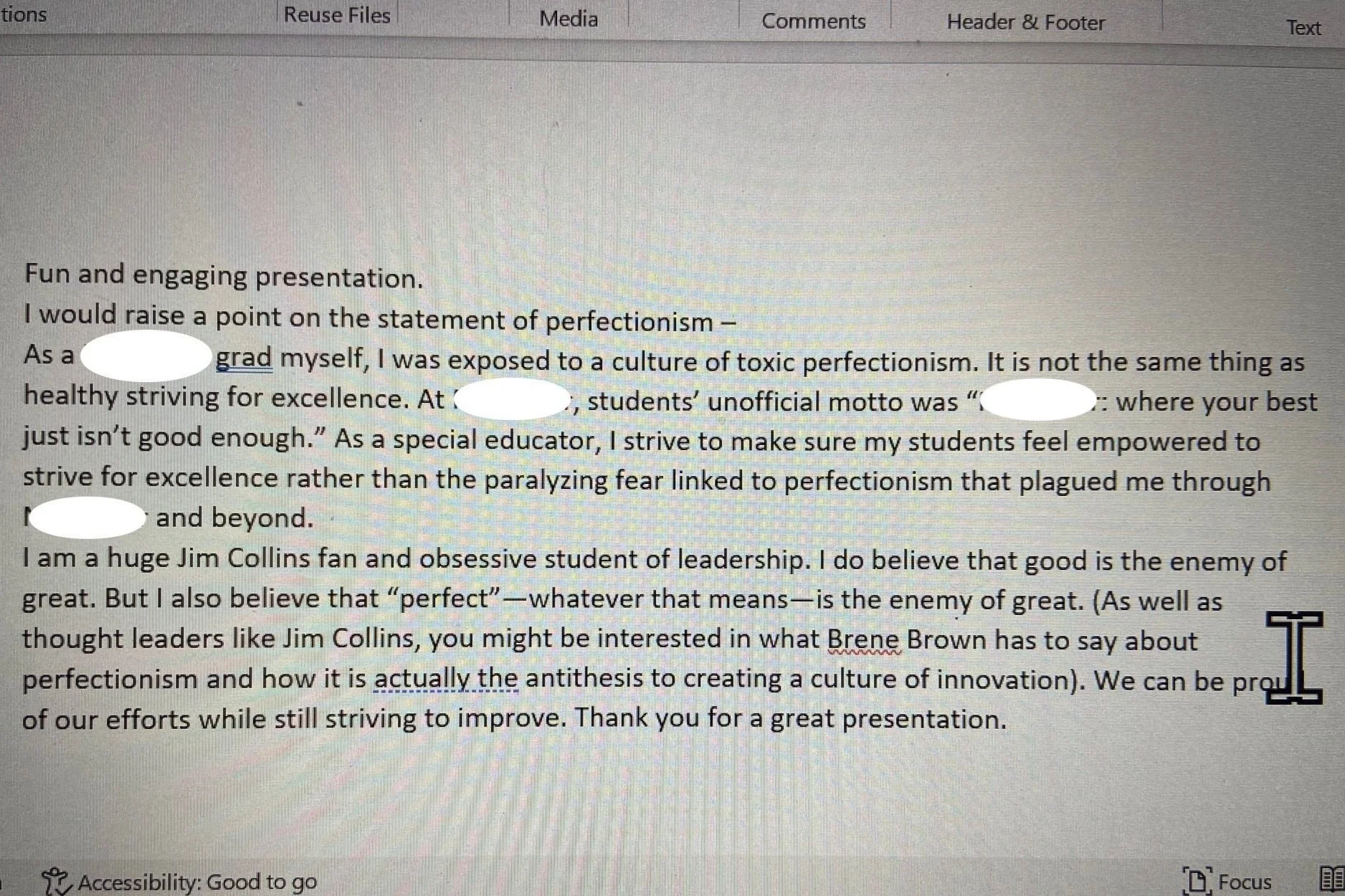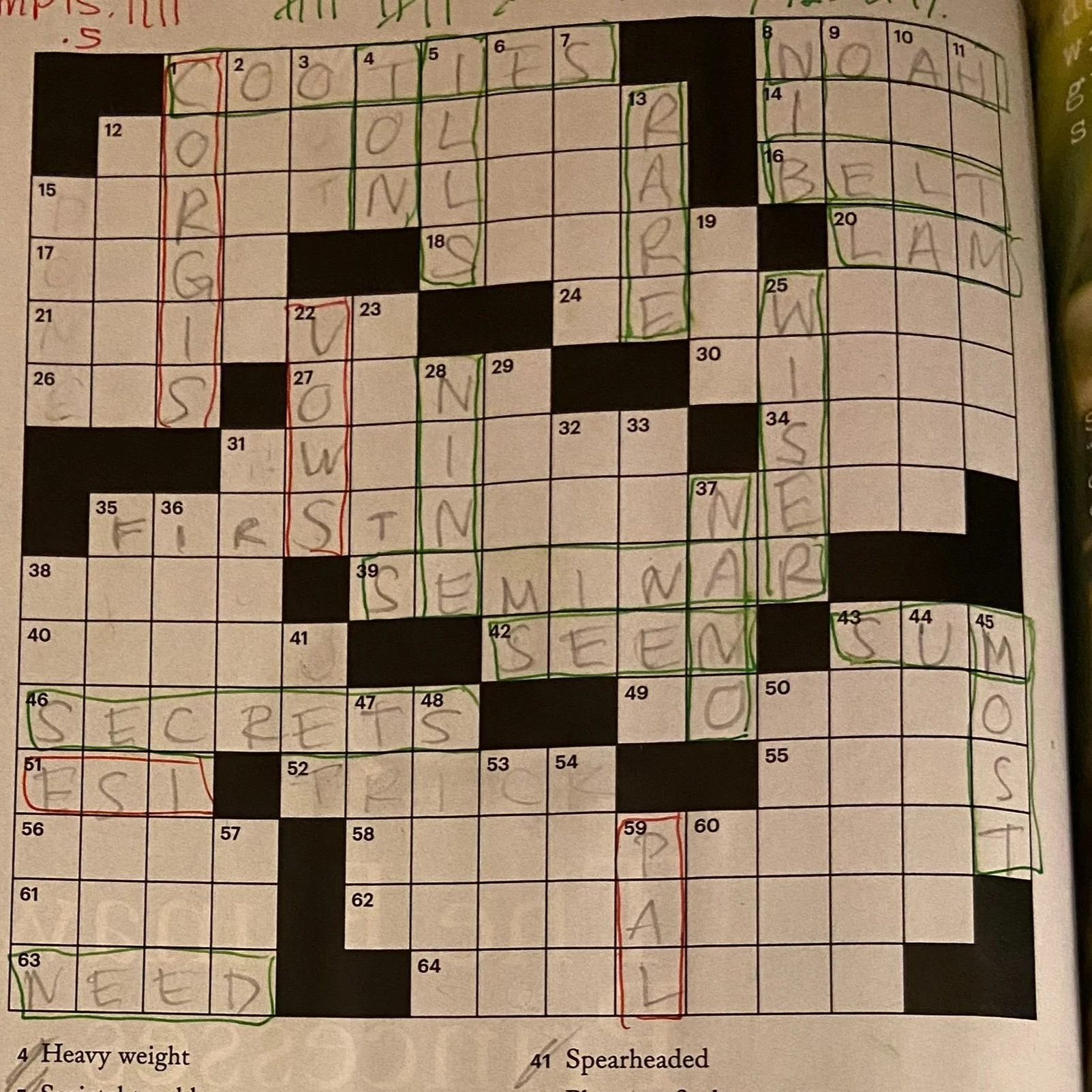Week 10
the perils and paralysis of perfectionism
I recently stumbled upon a short post I wrote in 2022, as a response to an alum of my high school who was touting perfectionism as the reason behind The Beatles’ genius as a band, and the success of my high school as an institution. I was lucky that the presentation was virtual, and that through my involuntary shaking I had the presence of mind to at least try to formulate a response (shown below).
This was my post. Far from perfect, but hopefully enough to make him pause and think. Here’s to a life of recovery from the perils and paralysis of perfectionism.
“Understanding the difference between healthy striving and perfectionism is critical to laying down the shield and picking up your life. Research shows that perfectionism hampers success. In fact, it’s often the path to depression, anxiety, addiction, and life paralysis.”
It wasn’t until I started studying Dr. Brown’s work that I could connect the self-sabotaging habits of my life, most or all of which lead back to perfectionism. For far too long, perfectionism lorded over me and my decision making processes, always ready to point out how I’m a screw-up who can’t do anything right. Perfectionism has kept me from finishing projects, from starting projects, from sharing projects, from staying with work when it gets hard, from feeling like I am capable of finishing work. Perfectionism has kept me in a liminal state, unable to commit to moving forward in any direction.
I don’t know the antidote to perfectionism. I do know the only ways I have extracted myself a little bit from its relentless grip: to consciously challenge its thought patterns, to set small goals of actions within my control and divorced from outcome, to celebrate small bits of progress, to share before I feel ready to share.
writing focus: screenplay
As I try to develop a habit of focusing on finishing one project at a time, I wanted to set a realistic goal. My writing coach shared how I should be thinking of goals I set, which really blew my mind: “think of a goal as trying to reach something off a shelf where you have to stand on your tiptoes and extend your arm to grab it. That’s it. Reach up, and grab it. A goal should not be something you have to drag out a chair to stand on or climb a ladder to reach. It should be something that challenges you a little by giving you something to reach for that you are comfortably able to reach with a little stretch. Then when you reach it, you can set another one.”
Starting on Monday, I decided to try out my new tool (below) to work on my screenplay for twenty minutes. I might not be able to write for hours straight each day, or solely focus on one project, but I can commit to working for twenty minutes each day on the same project until it’s finished. Twenty minutes is also a timeframe when I can turn off my critical mind and write something, because I can’t sit there paralyzed for twenty minutes wondering what is good enough to write. I just need to keep moving before the time runs out. I guess one way to conquer perfectionism is to not give it the time of day (or the time of my writing practice).
visual timer
For twenty dollars, I bought myself a visual timer tool, and have already experienced its magic. I love the fact that I can see the time counting down, and I’m not distracted thinking about how many minutes are left on my watch. I can just focus on writing “through the gray,” and quickly see the time shrinking while not breaking my train of thought. I adore it, and already don’t know how I’ve lived this long without it.
I also am committing to tracking the consecutive writing days for this screenplay on the homepage, which I will update each week with the fail count. Twenty minutes a day counts. When I finish the project, I will start on a new project that I will solely focus on for my twenty minutes per day writing sprints. Will this work? Who knows! I may abandon this idea after a week or a few months, or a year. But, like everything else on this project, I am running an experiment and then evaluating the results.
This brings me to my fails of the week:
spanish pronunciation:
Progress not perfection!
The Rosetta Stone app congratulating me on my progress, even as I only hit 67% pronunciation on language basics lesson 3, and is encouraging me to try it again.
crossword puzzle:
17 correct out of 72 possible = 24%
Attempted word total: 21.5
Thank you so much for the support, as always. Happy failing!
Rachel




